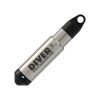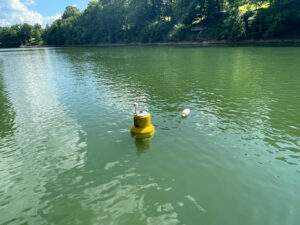Van Essen Diver-Mate Data Download Unit
Features
- Supplied with 16 GB memory card
- Built-in battery, rechargeable through USB-C
- Works seamlessly with new Diver-App
- Free ground shipping
- Expedited repair and warranty service
- Lifetime technical support
- More
Overview
The Van Essen Diver-Mate Data Download Unit is designed for simple and fast download of Diver groundwater data logger data, increasing download efficiency while reducing data transfer errors. A Diver DXT-Cable is used for connecting it to the Diver. Equipped with Bluetooth, it offers a wealth of possibilities for forwarding data, cloud storage and assessing the status of the well. The Diver-Mate also shows the DXT Cable signal quality and the Diver data download progress if Diver and cable are working correctly.
Data Collection
With 16 GB non-volatile memory drive, the Diver-Mate has more than sufficient capacity to store the data of thousands of Divers. Connect the Diver-Mate to a laptop using the supplied USB-C cable. The collected field data can easily be imported by Diver-Office for further processing. The files on the Diver-Mate can also be accessed through Windows File Explorer like any USB flash drive.
| Dimensions | 79 mm × 132 mm × 24 mm (W×L×H) |
| Weight | ~152 grams |
| Protection Classification | IP41 |
| Memory | 16 GB |
| Battery | Rechargeable Lithium Polymer |
| Battery Life | 10 days (single charge, dependent on usage) |
| Barometric Pressure Sensor | 400 to 1100 cmH2O |
In The News
NexSens X3 Data Logger Review
Extreme environments meet extreme design with the NexSens X3 Data Logger . The new logger offers the latest in real-time monitoring technology with wireless communication, a large plug-and-play sensor library and ultra-low power consumption, all in a waterproof marine-grade housing. The X3 is built to handle harsh weather, floods, high winds and rough seas, and it stands alone; no additional protective housing needed. With an operating temperature that ranges from -40°C to 70°C, the logger can withstand arctic environments and extreme heat. A conformal coating on the internal circuit board isolates it from moisture and humidity.
Read MoreBuoy-Based Solutions: Strengthening Kentucky’s Emergency Response Efforts
When Kentucky’s Emergency Response Team (ERT) has to act quickly in response to chemical and oil spills in the Commonwealth, they rely on small, easily deployable buoys to collect critical data that help minimize and evaluate damages in environmental emergencies. With a background in geology, Robert Blair primarily worked with groundwater and got involved sporadically with the ERT during groundwater contamination emergencies. Over time, this involvement led to him joining the ERT as an On-Scene Coordinator and then becoming the branch manager for the team and overall Emergency Response Branch .
Read MoreYSI ProQuatro Multi-Parameter Water Quality Meter Review
When environmental professionals need a reliable multi-parameter meter with measurement flexibility, the YSI ProQuatro is an affordable option. The YSI meter measures a combination of water temperature, conductivity, pH, ORP, ammonium, nitrate and chloride. [caption id="attachment_39045" align="aligncenter" width="940"] The YSI ProQuatro in use at the Fondriest Center for Environmental Studies. (Credit: Emma Jones / Fondriest Environmental) [/caption] Sensors plug into a 4-port bulkhead with an included temperature/conductivity probe. Dissolved oxygen sensors, pH and/or ORP sensors are often selected for the other ports.
Read More






























